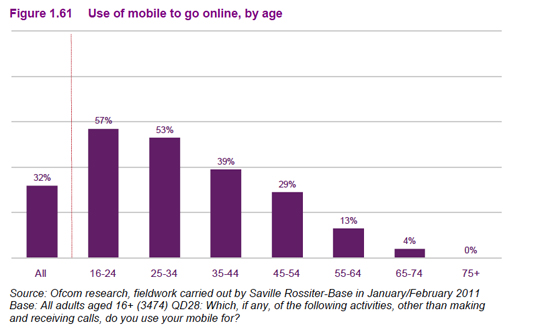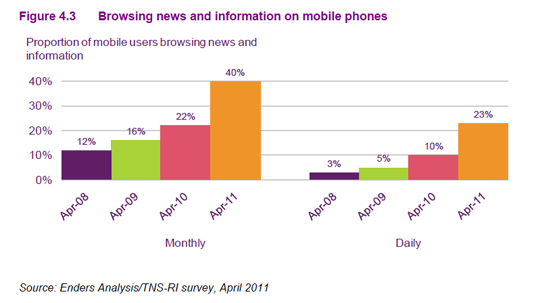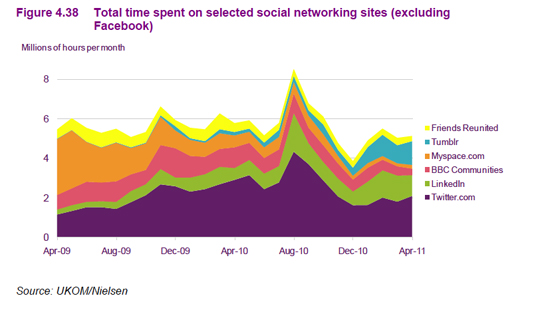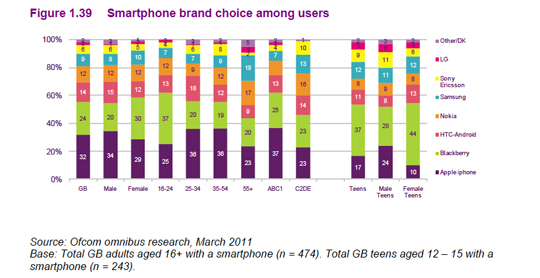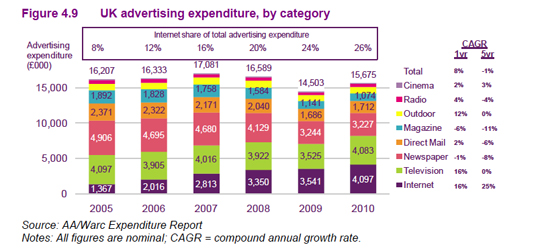Ofcom today (4 August) released its TV, radio, broadband, telecoms and mobile industries report, noting significant changes over the “digital decade” since 2001.
Here is the 341 page Communications Market Report boiled down to a list of 30 facts and figures that are relevant to publishers.
Smartphones
1. More than a quarter of adults (27 per cent) own a smartphone;
2. Almost half of teenagers (47 per cent) own a smartphone;
3. Nine out of 10 people (91 per cent) own a mobile phone;
4. Three in 10 mobile phones are smartphones;
5. Most people with smartphones (59 per cent) acquired their device in the past year.
Internet use
6. More than a quarter of people use their mobile phones for internet access. In the first quarter (Q1) of 2011, 28 per cent of UK adults claimed to do so;
7. Those aged 16-24 are more than 10 times more likely to go online via a mobile than those aged 55+;
8. More than three quarters (76 per cent) of homes are now connected to the internet;
9. For the first time household internet take-up (78 per cent) exceeded computer ownership (77 per cent) as a small proportion of households went online using mobile phones only;
10. More than two-thirds (67 per cent) of households have a fixed broadband connection and 17 per cent have a mobile broadband (dongle) connection. In Q1 2011, 26 per cent of over-75s had home internet access, as did 55 per cent of 64-74 year-olds;
11. Consumers use a wide range of devices to access the internet at home. In 2010, 69 per cent said they accessed the internet at home via a laptop or PC, 31 per cent via a mobile phone;
12. Wifi routers were used by 75 per cent of broadband using households in Q1 2011;
13. More than half of all UK households are passed by super-fast broadband;
14. Google has more than three times the user base of any other search engine;
15. The leading blogging site is Google’s Blogger, which reached 8.2 million users in April 2011.
Facebook and other social networking
16. Social networking accounts for more than a fifth of all time spent on the internet;
17. People spend more than five times as much time on Facebook than on any other site;
18. More than 90 per cent of social networking time is spent on Facebook;
19. The most popular claimed use of the internet on mobile phones was social networking services (used by 57 per cent of mobile phone internet users);
20. Mobile users of Facebook spent an average of 5.6 hours on the site in December 2010 (11 minutes a day);
21. In Q1 2011, 46 per cent of UK adults claimed to use social networking services on a home internet connection. There are signs that the growth of social networking may be reaching saturation point: total time spent on social networking sites was just 1.3 per cent higher in April 2011 than in April 2010.
Smartphone brands
22. The Apple iPhone is the most popular brand of smartphone, but BlackBerry handsets are a favourite choice among younger consumers;
23. Apple’s iPhone has a 32 per cent share among adults. This is the brand of choice among ABC1s (37 per cent) and is even higher among ABs alone (44 per cent). But BlackBerry handsets have also taken a significant share of the market (24 per cent) and are particularly popular among younger adults and teens (37 per cent each).
Advertising and commercial
24. More than a quarter of all UK advertising spend is on the internet. Advertising spend on the internet grew by 16 per cent in 2010, to more than £4 billion, accounting for 26 per cent of total advertising spend in the UK, marginally ahead of television;
25. Mobile advertising increased by 121 per cent in 2010 to reach £83 million;
26. In 2010, the mobile advertising market was only 2 per cent the size of the internet ad market. However, driven by increasing use of internet services on mobile phones, together with more sophisticated business models (for example, fully or partially advertising-funded mobile applications), mobile advertising revenue more than doubled during 2010. Search-based advertising increased by the greatest amount (172 per cent) and increased its share of mobile advertising from 54 per cent to 66 per cent;
27. Nearly three-quarters of internet users shop online. Visitors to coupon and reward sites increased by 25 per cent in the year to April 2011, when nearly 40 per cent of internet users visited at least one such site.
Apps
28. Just under half (47 per cent) of adult smartphone users have ever downloaded an app, with one in five (20 per cent) doing so regularly;
29. Regular apps downloaders are skewed male and age 25-34. Just over half (54 per cent) of apps downloaders have paid for an app – with their mean average maximum spend on a single app being £3 – £3.99;
30. Apps downloading is higher among teens than adults; around two-thirds (63 per cent) of teen smartphone users have ever downloaded an app, with one in four (28 per cent) doing so regularly. Six in ten (60 per cent) have paid for an app. The average maximum amount of spend among teens is £3.70 and the median is £3 – £3.99.
See a further 10 facts on mobile media.
All graphs taken from the Ofcom report.
